Health care directives and COVID-19
October 23, 2020
Health care directives and COVID-19
Author: | Publish Date: October 23, 2020
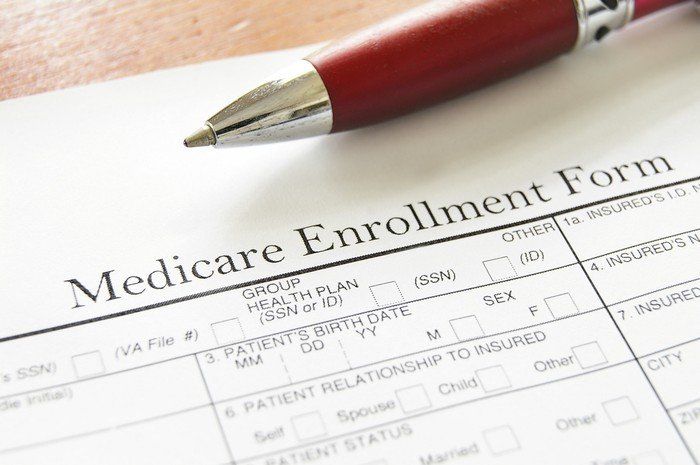
Health care directives and COVID-19
I. INTRODUCTION
The coronavirus pandemic has brought into sharp focus the precariousness of life and the uncertainty of the future. Anyone at any time could find herself the victim of a serious injury or illness. Even if you are spared from COVID-19, eventually you are likely to experience a medical crisis. Be prepared with your health care directives. Health care directives are legal documents that allow you to express your wishes for end-of-life care and to choose a person to make treatment decisions for you if you are unable to make them for yourself. Preparation now is the key to sound decision-making in a health crisis later. In her moving article, I’m a Doctor in a COVID-19 Unit. Here’s One Vital Step I Wish Everyone Would Take, Dr. Asha Shajahan makes a compelling case for health care directives. Dr. Shajahan observed that just one of the 55 patients in her unit had a health care advance directive. She had to ask the other patients about their wishes for critical care and end-of-life treatment, decisions that were terrifying for them to make while alone and very sick. Some of her patients were sedated and on ventilators making it impossible for them to express their treatment wishes. She mentioned one young man who was on a ventilator and near death. Sadly, his parents disagreed on his treatment. His father wanted to let him pass peacefully, while his mother wanted him to have any treatment that might keep him alive. Dr. Shajahan described talking to the sister of a 37-year-old man who was also on a ventilator. The sister did not know her brother’s treatment wishes and was too overwhelmed to make decisions for him. Dr. Shajahan’s experience on the COVID-19 unit convinced her to put her own health care directives in place and she urged others to do the same while at home and healthy. COVID-19 can be a springboard to important discussions with loved ones about what medical care you want and who you want to make medical decisions for you if you cannot speak for yourself. Facing these questions can be difficult, but answering them can bring you peace of mind and relieve your family of the burden should you become critically ill. With properly executed health care directives, you can save your loved ones the pain of indecision and disagreement over your treatment and the guilt of thinking that they may have made the wrong decisions for you.
Download a printable version of this article
II. LIVING WILLS
A. WHY YOU NEED A LIVING WILL ESPECIALLY DURING THE COVID-19 PANDEMIC A living will is a legal document that states your wishes regarding end of life medical treatment. Your state may have a specific form you should use and sometimes it is called by a different name. Other names for a living will include:
• Advance directive.
• Advance medical directive.
• Advance decision form.
• Advance health care directive. Many of the serious cases of COVID-19 require immediate decisions regarding emergency treatment to keep the patient alive. Decisions that might come up at this time relate to:
• CPR (cardiopulmonary resuscitation)
• Ventilator use
• Artificial nutrition (tube feeding) and artificial hydration (IV, or intravenous, fluids) • Comfort care In this situation, having a living will help ensure you receive care according to your wishes.
1. WHAT A LIVING WILL DOES
A living will outlines the type of medical treatment you wish to receive (or not to receive) if you become terminally ill and are no longer able to make your own decisions or are permanently in a vegetative state. The living will helps your family and health care professionals determine whether you want death-delaying procedures in these situations. A terminal condition usually means an incurable and irreversible condition where death is imminent and the use or application of any death delaying procedures serves only to prolong the dying process. A few things a living will does not do include:
• Appoint a representative to carry out your wishes.
• Apply to conditions that are not terminal or vegetative.
• Appoint a representative to manage your property or finances.
2. WHO CAN MAKE A LIVING WILL
Any competent adult can make a living will. Different states may have slightly different standards, but in general, an adult is anyone over the age of 18. Competent means that the person executing a living will understands the document he or she is signing and can communicate his or her wishes.
3. WILL MY DOCTOR HONOR MY LIVING WILL?
Your doctor does not have to honor your living will if he or she has religious, moral, or ethical objections or believes it would not be consistent with sound medical practice. However if your doctor does have such objections, he or she is ethically obligated to transfer your care to other providers who are willing to follow your wishes. The best policy is to make sure in advance that you have a doctor who will follow your wishes by taking these three steps. First, give your doctor a copy of your living will, discuss your decisions with the doctor, and get assurances that he or she will abide by them. Second, execute a health care power of attorney that names an agent to make health care decisions for you when you no longer have the capacity to make decisions for yourself. Give your agent a copy of both your living will and health care durable power of attorney and make sure he or she is prepared to see that they are followed. Third, share these documents with close family members and make sure they are aware of your wishes.
4. MUST I HAVE A LIVING WILL?
There is no legal requirement that you have a living will. However, a living will is a good idea for several reasons:
• To ensure your wishes are followed regarding medical care at the end of your life. A living will allows you to direct which, if any, life support measures you wish to refuse if you are terminally ill or permanently unconscious and cannot communicate.
• To relieve your loved ones of the burden of making end-of-life decisions without knowing your wishes.
• To enable your doctor to follow your instructions. Without a living will, a doctor may be concerned that it may constitute medical malpractice or even a crime if he or she withholds or removes treatment.
• To keep your private wishes on dying out of the probate court, where these disputes may end up. Without a living will, your family and medical care providers may disagree as to what care should be provided or withheld. If they don’t all agree, the matter may end up in court.
B. TREATMENT CHOICES IN YOUR LIVING WILL
A living will allows you to request your health care providers to administer life-prolonging treatment, withhold such treatment, or stop such treatment after a specified time. Living will forms vary from state to state but all cover similar topics related to end of life care and death. Some spell out particular treatments that you can choose or decline, while others simply allow you to choose between requesting life-prolonging treatment or refusing life-prolonging treatment. In some states, you are not required to use the state form; you can use a custom-drafted one. Common items to consider are whether:
• You want medical personnel to attempt to resuscitate you should you experience cardiac arrest.
• You want to be placed on a ventilator to help you breathe.
• You want to be hydrated and fed through IVs and a feeding tube if you can’t eat or drink.
• You want dialysis if your kidneys fail.
• You want to be given medication to treat infections.
• You want to undergo surgery if necessary to prolong your life.
• You want only palliative care to keep you comfortable and pain-free. Discussing these decisions with your doctor before making your living will is a good idea. Your doctor can explain the risks, benefits, and consequences of these treatments so you can make a more informed decision. Your doctor can also tell you if he or she has reservations about following your instructions which will allow you the opportunity to find another doctor. A living will may also indicate your:
• Desire to become an organ or tissue donor.
• Religious preferences.
• Burial and final disposition wishes (e.g. cremation).
C. EXECUTION OF YOUR LIVING WILL AND STORAGE AND DISTRIBUTION OF THE DOCUMENT
1. EXECUTION REQUIREMENTS FOR A LIVING WILL
You must be mentally competent (i.e. able to understand the document) when you sign your living will. If you are competent but have impaired function (e.g. cannot write), someone may be able to fill in the blanks for you, but no one can create or execute a living will on behalf of another person. The choices must be your own. Once you have completed the living will, you will have to follow your state’s requirements for execution. Most states require either one or two witnesses to verify your signature in their presence or notarization of your signature on the document. Certain persons may be disqualified as witnesses, such as your doctors, nurses, beneficiaries of your estate, and relatives.
2. WHAT TO DO WITH YOUR LIVING WILL
Once you have properly executed your living will according to your state’s requirements, you should keep the original document in a safe, but accessible place. Tell someone you trust where it is. You also should provide copies to your regular health care providers and the hospital or care facility when you are admitted. Your health care providers can follow your wishes only if they know them. Because COVID-19 can strike quickly and healthcare systems may be overwhelmed, you may want to make sure some-one you trust has a copy readily available to present to health care providers. If you have a health care durable power of attorney (discussed in II below), you should give a copy of your living will to your agent. Consider also giving copies to family members so they understand your wishes and do not inadvertently interfere with them.
3. IS MY LIVING WILL VALID EVERYWHERE?
Each state has laws, forms, and procedures, so it is best to consult an attorney or prepare a new living will if you move from one state to another. Not all states will recognize a living will from another state. The U.S. Supreme Court has ruled that each state has the authority to decide what evidence is “good enough” to determine someone’s wishes about end of life decisions.
D. WHEN A LIVING WILL TAKES EFFECT
States may have slightly different laws about when a living will takes effect, but generally, it takes effect only if you are deemed incapacitated and incompetent by at least one doctor and death or a persistent vegetative state is imminent. If you are temporarily incapacitated, the living will does not take effect. For example, if your medical condition does not allow you to speak but you are likely to recover, your doctors cannot invoke the living will. In situations of temporary incapacity, an agent under a health care durable power of attorney (covered in III below) may be able to make decisions for you.
E. CHANGING OR REVOKING YOUR LIVING WILL
You have every right to change or revoke your living will if you change your mind about the contents. As long as you remain mentally competent, you can change or revoke your living will at any time. It’s a good idea to review your living will from time to time to make sure it still expresses your wishes. Good times to do so are before you enter the hospital for treatment, when you are diagnosed with a serious condition, and when your marital status changes. State laws typically provide that you can revoke a living will by destroying the original, executing a written document revoking the living will, or executing a new living will that is inconsistent with the old one. The best way to revoke your old living will is by destroying it (e.g. tearing it, striking it with lines, or shredding). Then you can execute a new living will and redistribute it. Be sure to give a copy to everyone to whom you gave a copy of your former living will—your doctors, hospital or care facility, health care agent, and family. Just to make sure there is no confusion about which version of a living will is in effect, your new living will should be dated and state that it revokes all prior living wills.
III. HEALTH CARE DURABLE POWER OF ATTORNEY
A. WHY YOU NEED A HEALTH CARE DURABLE POWER OF ATTORNEY (DPOA) ESPECIALLY DURING THE COVID-19 PANDEMIC
A living will is an important document to have, but it has some limitations. A health care durable power of attorney (DPOA) is a legal document that provides more versatility and the ability to appoint a health care agent to speak and act on your behalf. The symptoms of COVID-19 affect people differently. It can strike even a healthy person without warning and the situation can escalate quickly. If you become ill with COVID-19 you might be temporarily incapacitated for a time but then recover. This is the type of situation for which a health care DPOA is designed.
1. WHAT A HEALTH CARE DPOA DOES
A health care DPOA allows you to appoint a health care agent or representative to make decisions on your behalf if your condition doesn’t allow you to make your own decisions. The health care DPOA applies to all health care decisions for all types of medical conditions, not just when death is imminent or you are in a vegetative state. It allows you to outline your philosophy as to the types of treatment you want to receive or decline including end of life care. Thus, it is much broader than a living will, which only expresses your desires if you are terminally ill and/or permanently unconscious and are unable to express your wishes regarding the use of life-prolonging procedures.
2. WHO CAN MAKE A HEALTH CARE DPOA?
Generally, you must be at least 18 years old to execute a health care DPOA. Additionally, you must be mentally compe-tent to understand what the health care DPOA is, what powers the health care DPOA gives, and the effect of granting such powers to a health care agent.
3. WHY A HEALTH CARE DPOA IS NECESSARY
A health care DPOA may be one of the most important legal documents you will ever sign especially during the COVID-19 pandemic. Unfortunately, you never know when you might suddenly need someone to make medical decisions for you. Every year in the United States over 700,000 people have a heart attack and 800,000 suffer a stroke. By early June 2020, the United States had nearly two million confirmed cases of COVID-19 and over 100,000 deaths. Having a health care DPOA allows you to prepare in advance for these kinds of emergencies. The health care DPOA helps ensure that the right person will be making decisions for you and the decisions are consistent with your values and wishes.
4. WHAT HAPPENS WHEN YOU CAN’T MAKE MEDICAL DECISIONS IF YOU DON’T HAVE A HEALTH CARE DPOA
Laws vary from state to state. Generally, state laws give family members decision making authority with a spouse having top priority, followed by adult children, parents, adult siblings, and more distant relatives. This makes sense because generally family members are considered to be in the best position to know what treatment decisions you would make for yourself if you were able. However, there is no guarantee that a decision made by a family member won’t cause problems. When stress is high and a loved one’s health hangs in the balance, conflicts among family members are possible. Some family members may make decisions based on ignorance, a desire to end family distress, or downright bad faith and personal motives. Depending on the situation, the most knowledgeable decision-maker may not even be a member of the family. Further, with health care systems overwhelmed by treating COVID-19 patients, there might not be time to figure out who has the authority to make decisions. The health care DOPA eliminates all this uncertainty. For these reasons, it is much better for everyone– you, your healthcare providers, family, and friends if a health care DPOA is in effect. It allows you to choose your decision-maker. Whether you have a health care DPOA or not, you should have conversations with key people in your life about your wishes for medical treatment. Do this for your family and not just yourself. Let them know what you want them to do if the time comes that they must speak for you.
5. WHY YOU NEED A HEALTH CARE DPOA EVEN IF YOU ARE MARRIED
By signing a health care DPOA, you help ensure that the right person will be making decisions for you and that you will receive the best and most appropriate health care possible. You should have a health care DPOA even if you are married. If you have a spouse and children from previous relationships or adult children, they may disagree about your treatment or which of them should be the decision-maker. The appointment of the health care agent will reduce conflict in this high-stress situation. If you want to name someone other than your spouse to be the decision-maker, you will need a health care DPOA. Additionally, if you and your spouse are in a simultaneous accident, your health care DPOA can name a successor or alternate health care agent to act on your behalf.
6. WHY YOU NEED BOTH A LIVING WILL AND A DPOA FOR HEALTH CARE
Preparing for the unexpected means having the right documents in place. As discussed here, a living will and health care DPOA serve different legal functions. A living will is limited to end of life situations and is used to outline your wishes regarding life-prolonging measures if there’s no reasonable hope of recovery, for example, in the event of brain death, permanent unconsciousness, or terminal illness. A health care DPOA, on the other hand, covers all health care decisions and lasts only as long as you are incapable of making decisions for yourself. It is also the legal document that allows you to appoint a health care agent to act on your behalf. Therefore, it is important to have both documents. Often state forms combine the two in one document.
B. CHOOSING YOUR HEALTH CARE DPOA AGENT
1. WHOM TO CHOOSE
The person you name in your health care DPOA and trust with your healthcare decisions is called your health care agent. (Other terms you may encounter are health care surrogate, proxy, or representative.) If you cannot communi-cate or your health prevents you from making decisions, your health care agent will step into your shoes. Your agent will make health care decisions based on what you outline in your health care DPOA, living will, and what he or she understands your wishes to be. Your choice of health care agent is of critical importance. When considering whom to choose, look for someone who:
• Knows you well and is willing to talk to you about sensitive issues, including end of life care.
• Understands your values and wishes, respects them, and will forcefully pursue them despite opposition.
• Is immediately available, reliable, and willing to serve.
• Is articulate and has strong advocacy skills.
• Understands medical issues.
• Can deal with potential family conflicts. Most people choose their spouse, an adult child, or another close adult relative. But your health care agent does not need to be a relative. A trusted friend is a fine choice. If you have named an agent for financial decisions under a financial durable power of attorney, you may want to choose the same person as your health care agent. As a general rule, you may not name any of your doctors or other health care providers or employees of your health care providers or of the hospital or other facility at which you receive care.
2. CHOOSING MORE THAN ONE AGENT OR AN ALTERNATE AGENT
Many states allow you to appoint two or more persons to serve as co-health care agents. For most people, appointing co-agents is not a good idea. The agents may disagree, which can confuse health care providers, and delay a crucial decision. The stalemate could even need to be broken by a judge. In most circumstances, the better choice is to name one primary health care agent and one or two successor agents. A successor agent serves only if the first health care agent is unable or refuses to serve. This is ultimately your decision and should be based on your circumstances. WHAT DECISIONS YOUR HEALTH CARE AGENT CAN MAKE You can decide what decisions you want your health care agent to make. You can give your health care agent broad authority to make virtually all health care decisions for you if you are unable to make them for yourself. Or you can limit the agent’s power. Some people limit their agent’s power to the instructions in their living wills. With broad powers, your health care agent will be able to:
• Access your medical records.
• Decide in which medical facilities you will receive care.
• Choose your health care providers.
• Visit you when you are in a hospital or medical facility Consent to or refuse most types of medical and mental health treatment. State law may provide that certain treatments cannot be authorized by your health care agent. These typically include abortion and some extreme mental health treatments. Your agent also cannot authorize treatment or withdrawal of treatment in conflict with your living will. Furthermore, your agent must make your health care decisions according to the agent’s knowledge of your wishes, which is why it’s so important for you to have a candid discussion with him or her. If the agent does not know your wishes, the agent must base the health care decisions on your best interests. So long as you have full confidence in your agent, consider giving him or her broad powers to make decisions for you as it can be difficult to foresee what anyone’s medical needs may be in the future. Giving your agent full authority may reduce the chances of having the issue end up in court.
D. EXECUTING YOUR HEALTH CARE DPOA AND STORING AND DISTRIBUTING THE DOCUMENT
1. EXECUTION REQUIREMENTS FOR A HEALTH CARE DPOA
Each state has execution requirements for a completed health care DPOA to become effective. Some states provide a form, the use of which may or may not be mandatory. You will need to verify your specific state requirements and may want to consider seeking counsel or an advocate who can advise you. First, you will want to make sure you complete all the necessary information on the health care DPOA. Next, you want to arrange for execution. Most states require you to sign and date the document in front of either two witnesses or a notary. Certain persons may be disqualified as witnesses such as relatives, beneficiaries of your estate, the person named as your agent, and your health care providers.
2. WHAT TO DO WITH THE EXECUTED DOCUMENT
Once you have properly executed your health care DPOA according to your state’s requirements, you should keep the original document in a safe, but accessible place. Tell someone you trust where it is and make sure that person can access it. Provide copies to your regular health care providers, to your agent, and to any alternates. Your agent may need a copy to prove his or her authority to medical personnel. If you are admitted to a hospital or care facility, provide it with a copy as well. During the COVID-19 pandemic when healthcare systems may be overwhelmed, it is also a good idea to have a copy ready to take with you if you need emergency care.
E. WHEN A HEALTH CARE DPOA GOES INTO EFFECT
Your health care DPOA goes into effect when you become unable to make your own health care decisions. Some states may require a doctor to determine that you lack the ability, or “capacity” to make your own health care decisions. Lack-ing capacity usually means
(1) you cannot understand the health care choices that are available to you including the risks, benefits, and alternatives to these choices, or
(2) you are unable to articulate your wishes in any way, including orally, in writing, or through other gestures. What this means is that if you are severely injured or sick and you cannot express your health care wishes, your health care DPOA will immediately take effect. In some states, it is possible to give your health care agent the authority to manage your medical care immediately. In other states, you may have to wait for a doctor to decide. Even if your document provides for your health care agent to immediately dictate your medical care if you lack the ability to do so, your health care agent must always act in your best interests and diligently try to follow any health care wishes you’ve expressed in your health care DPOA and living will.
F. CIRCUMSTANCES UNDER WHICH YOUR HEALTH CARE DPOA MIGHT END
Your executed health care DPOA will remain in effect as long as you are alive unless there is specific action by you or a court. Below are some circumstances in which your health care documents can become ineffective:
You revoke your health care DPOA:
You have the right to amend or revoke your health care DPOA at any time as long as you remain mentally competent. If you revoke your health care DPOA make sure your agent(s) and health care providers know the document has been revoked and is no longer effective.
The court determines your health care DPOA is invalid:
Although very rare, under certain circumstances, the validity of your health care DPOA may be questioned. In these situations, the matter may end up in court to determine the validity of the document. Most judges recognize that a court is normally not the right place to make health care decisions, but sometimes is the most appropriate place to determine the validity of a document. Challenges tend to be more common when family members disagree with choices your health care DPOA outlines, or people have issues with your health care agent. Some reasons a court can rule on your health care DPOA include:
You lacked mental capacity:
If someone doubts that you had the requisite mental capacity at the time you prepared your health care DPOA, that individual can file a motion in court to invalidate your health care DPOA. The person bringing the motion in court bears the burden of proof. This means the law presumes you had the mental capacity and the person filing the case has to prove otherwise.
The execution was improper:
Every state has specific execution requirements for a health care DPOA. If your doc-ument was not properly executed, a court can invalidate it. An example might be if you did not have the document notarized and state law requires notarization for the document to be valid. However, in these situations, your inten-tions outlined in the health care DPOA may still be relevant and used as evidence of what your wishes are. In a United States Supreme Court case, Cruzan v. Director, Missouri Dept. of Health, 497 U.S. 261 (1990), the Court determined that an improperly executed health care DPOA can be used as strong evidence of someone’s wishes for care and still be honored. In other words, your wishes should not be ignored simply because of a technical error.
Your agent’s authority is revoked:
A health care agent is obligated to make decisions based on your wishes in your health care DPOA. If your health care agent does not act according to your best interests or wishes, any concerned person can ask the court to review the health care agent’s behavior. If a court finds that your agent is acting improperly, it will revoke the agent’s authority. Then, the authority will pass to the alternate agent you named in your document. If your health care DPOA does not name an alternate, a conservator or guardian may be appointed to make health care decisions for you.
Death:
A health care DPOA is no longer valid once you die. However, some of the directions or instructions in the document may remain effective after your death for some very limited purposes. For example, your health care agent may be allowed to supervise the disposition of your body, including authorizing an autopsy or organ donation if your health care DPOA gives these powers.
Divorce:
A divorce will not affect the validity of your health care DPOA, but if you named your spouse as your health care agent, his or her authority is automatically revoked in some states. In this circumstance, if you named an alter-nate, he or she will become the agent. However, to avoid confusion, it is best to execute a new health care DPOA. G. CHANGING OR REVOKING YOUR HEALTH CARE DPOA Over time circumstances can change and you may want to change or revoke your health care DPOA. You will need to take an affirmative step to revoke the document, usually physically destroying the actual document and all copies or executing a written revocation. Make sure to check your state’s revocation requirements. Once you revoke your health care DPOA, you should notify your health care agents and your health care providers of the revocation. Additionally executing a new health care DPOA revokes any previous document as long as it so states. Make sure your health care agent and your health care providers are notified and have copies of the new document.
IV. CONCLUSION
COVID-19 can strike anyone without warning and the symptoms can escalate quickly. Making sure you have the nec-essary legal documents in place if you require care is an important action item you should not take lightly or delay. Both a living will and a health care durable power of attorney are essential in preparing for the COVID-19 pandemic and any other health situations that might arise. An estate planning attorney can help you get your documents in place promptly. During the pandemic, many attorneys are conducting consultations by phone and video conferencing. An estate planning attorney in your state will be able to advise you on the best way to execute your documents while maintaining social distancing.
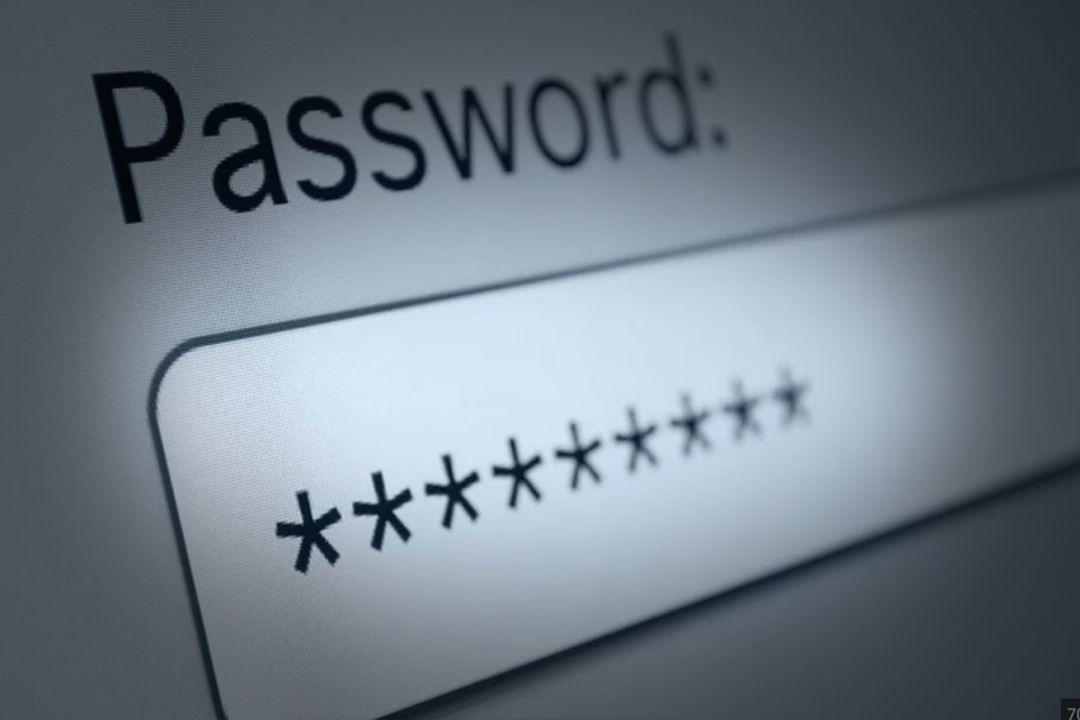
The Importance of Changing Passwords: Enhancing Security Amidst Inconvenience In today's digital age, where our lives are increasingly intertwined with technology, the security of our personal information is paramount. One of the simplest yet most effective measures we can take to protect ourselves online is regularly changing our passwords. While this practice may seem inconvenient at times, its significance cannot be overstated. Why Change Passwords? Passwords are the first line of defense against unauthorized access to our accounts, whether it's our email, social media profiles, online banking, or other sensitive information. Over time, however, passwords can become compromised due to various factors: 1. Data Breaches: Large-scale breaches happen frequently, exposing millions of passwords to cybercriminals. 2. Phishing Attacks: Deceptive attempts to trick users into revealing their passwords are increasingly sophisticated. 3. Weak Passwords: Passwords that are easy to guess or reuse across multiple accounts are vulnerable. Regularly changing passwords mitigates these risks by reducing the window of opportunity for attackers to use compromised credentials. Even if your password hasn’t been directly exposed, changing it periodically adds an extra layer of security. Best Practices for Strong Passwords When updating passwords, it’s crucial to adhere to best practices to maximize security: • Complexity: Use a mix of uppercase letters, lowercase letters, numbers, and special characters. • Length: Aim for a minimum of 12 characters; longer passwords are generally more secure. • Uniqueness: Avoid using the same password across multiple accounts to prevent a single breach compromising all your accounts. • Avoid Personal Information: Refrain from using easily guessable information like birthdates or pet names. Managing the Inconvenience Despite understanding the importance of changing passwords, many users find it inconvenient. Here are some tips to manage this process effectively: • Password Managers: These tools securely store and generate passwords, making it easier to maintain unique and strong passwords across accounts. • Set Reminders: Use calendar reminders or built-in features of password managers to prompt regular password updates. • Two-Factor Authentication (2FA): Enable 2FA wherever possible to add an extra layer of security beyond passwords. The Bottom Line While changing passwords might seem like a hassle, it’s a small inconvenience compared to the potential consequences of a security breach. By doing so, you’re actively taking control of your online safety and reducing the risk of falling victim to cyberattacks. Whether you’re protecting personal information or sensitive business data, regular password changes are a crucial step in safeguarding against cyber threats.

Is it love, or is it a scam: Navigating the Perils of Romance Scams In today’s digital age, finding love online has become increasingly common. Dating apps, social media platforms, and matchmaking websites offer convenient avenues to connect with potential partners worldwide. However, amidst the possibilities of romance lie lurking dangers—romance scams. These fraudulent schemes prey on individuals seeking companionship, exploiting their emotions and trust for financial gain. The Rise of Romance Scams Romance scams have surged in recent years, fueled by the proliferation of online dating and social media. According to the Federal Trade Commission (FTC), Americans reported losing a staggering $547 million to romance scams in 2020 alone. Since then, those numbers have only continued to rise. How Do Romance Scams Work? Typically, romance scammers create fake profiles on dating sites or social media platforms, portraying themselves as sincere and attractive individuals. They invest time in building a relationship with their victims, showering them with affection and attention to foster a sense of intimacy. Once trust is established, the scammer often fabricates a crisis—a sudden illness, a financial emergency, or a need to visit the victim—which requires money to resolve. Warning Signs to Look Out For Recognizing the signs of a romance scam can prevent devastating financial and emotional losses: 1. Too Good to Be True: Scammers often present themselves as ideal partners, displaying an unnaturally perfect profile. 2. Quick Professions of Love: Declarations of love or intense emotions early in the relationship may indicate manipulation. 3. Requests for Money: Be wary of sudden requests for financial assistance, especially if the person has not met you in person. 4. Inconsistencies in Stories: Pay attention to inconsistencies in their background or details that don’t add up over time. Protecting Yourself Against Romance Scams 1. Verify Identity: Use reverse image searches or request video calls to verify the person's identity. 2. Guard Personal Information: Limit the amount of personal information shared online, especially financial details. 3. Remain Cautious: No matter the trust level that has been established, always question unusual requests for money or assistance, especially if the person claims it’s urgent. 4. Report Suspicious Activity: If you suspect a scam, report it to the platform where you met the individual and to authorities like the FTC or local law enforcement.

Long warm-weather seasons and the abundance of beautiful lakes naturally make recreational boating a popular pastime on area lakes. Sadly, each year tallies thousands of boating accidents and hundreds of fatalities, statistics that are inevitably increased due to impaired vessel operators. Needless to say, other factors influence boating accidents, but it is safe to say none of them listed here is more easily avoidable, or in the operator's full control than operating a watercraft under the influence of alcohol or drugs. Here are some important reminders of how to keep yourself and your loved ones safe while boating. WHY ARE BOATING ACCIDENTS SO DANGEROUS? Unlike an accident on dry land, emergency medical assistance is not readily available on the water. And, if the boat operator is injured, there may not be anyone else who can summon help or drive the boat to shore. In addition, drowning is the cause of an overwhelming majority of boating accident fatalities (79%). When a vessel operator or passenger goes into the water as the result of a crash, it is unlikely that help will arrive in time to save them. Knowing that many of these deaths could have been prevented if the victims had worn life jackets makes the statistics even more tragic. WHAT ARE THE MOST COMMON CAUSES OF BOATING ACCIDENTS? The U.S. Coast Guard identifies the following top 10 causes of recreational boating accidents: Alcohol use (by boat drivers and passengers) Operating a watercraft under the influence of alcohol or drugs is dangerous AND illegal. Alabama boating laws state that "No person shall drive or be in actual physical control of a vessel or manipulate any water skis, aquaplane, or any other marine transportation device while: there is 0.08% or more by weight of alcohol in the blood. (BAL) under the influence of alcohol. under the influence of a controlled substance. under the combined influence of alcohol and a controlled substance. under the influence of any substance that impairs the mental or physical faculties of the person. Refusal to submit to a field breath test or other approved testing shall result in the same punishment as provided for operators of motor vehicles on the state highways (automatic suspension of vessel license). Operator inattention Many accidents are caused by a distracted operator who fails to notice an oncoming vessel, sudden squall, swimmers, or other impending danger. Improper lookout For decades best-practice guidelines have recommended a second individual be assigned the role of "spotter" in recreational boating. The spotter's role is to be an extra lookout for swimmers or other potential hazards so the vessel operator can focus solely on controlling the vessel. Like a distracted boat driver, a designated lookout person who is not paying attention may inadvertently cause an accident by failing to warn the operator about potential hazards. Lack of operator instruction and experience Some data shows as much as 70% of boating fatalities occur on boats where the operator had not received proper boating safety instructions. In contrast, fatal accidents involving operators who had earned nationally-approved boating safety education certificates typically make up less than 20% of annual fatality totals. Experience as a boat operator can be harder to gain as recreational boating does not usually occur on a daily basis. Excessive speed Just like on public highways, speeding is a major cause of serious boating accidents. In fact, driving a boat at high speed can be more dangerous than speeding in a car because it takes more time to stop or change direction in order to avoid a crash Machinery or equipment failure A defective part or equipment malfunction can cause a serious accident. This could be caused by poor maintenance or a flaw in the design or manufacture of the vessel or equipment. Navigation rules violation Being unfamiliar with the rules governing certain lakes and waterways can result in collisions where people are injured or killed. Navigational laws can vary, even within the same state, so it’s wise to become familiar with the rules for each destination. Hazardous weather conditions Weather can change rapidly, especially in large bodies of water. Even if the weather is fair at the beginning of a ride, boat operators should monitor weather reports throughout the trip and watch for changing conditions. Rough water due to currents or tidal flow Sudden shifts in the current or tide can result in rough and hard-to-navigate waters, particularly for smaller boats. Therefore, operators should be extra cautious when entering areas that are known for these conditions. Force of wave/wake When the hull of a boat moves through the water, it creates waves that are known as a wake. Depending on the size and speed of the boat, these waves can be quite strong. In addition, a wake created by a large boat can cause a smaller boat to capsize or veer into another boat. View the full Alabama boating laws page online
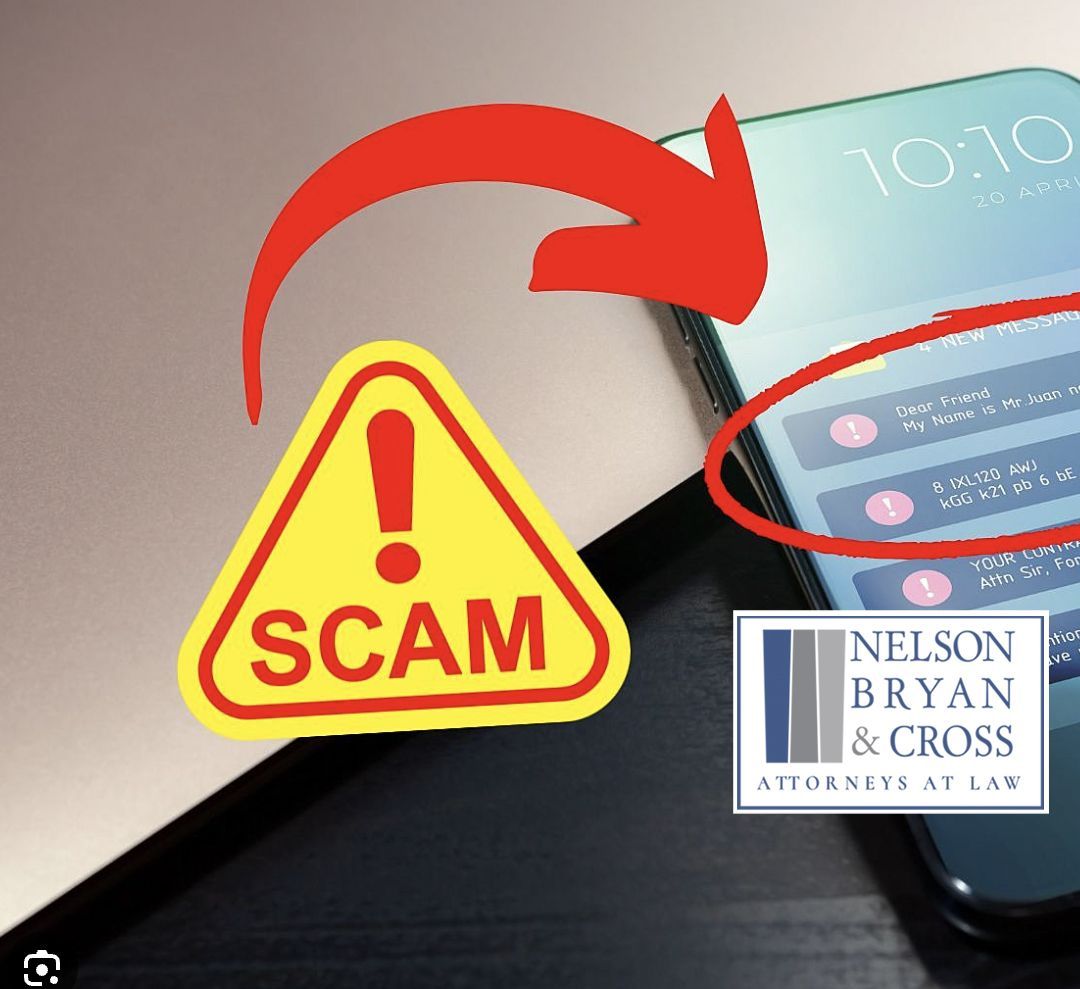
Telephone Scams and Mail Fraud have been around for a long time, with bad actors attempting to take advantage of innocent and vulnerable people. When email became common in our society, it didn't take the bad guys long to adapt their tactics and modern culture called these new forms of email attacks "Phishing Scams." Now, more than ever, modern smartphones allow business to be conducted by text and it is not surprising that scammers are once again targeting this new technology. The common goal of all of these attacks is to steal money from unsuspecting victims. The technical name for what most of us call a text message is SMS, which stands for "Short Message Service." Combining this new acronym with the now common email Phishing Scam gives us "Smishing Scams," yet another threatening term those of us doing business on our phones need to be alert to. Like phishing emails, smishing texts are social-engineering scams that aim to manipulate people into turning over sensitive data such as Social Security numbers, credit card numbers, and account passwords or providing access to a business computer system. They rely on persuading you that the sender is a familiar or trusted source and that urgent action is needed to secure a benefit, resolve a problem, or avert a threat. They might come from a mobile provider, or a service like Netflix or PayPal , claiming your account has expired or been locked, and you need to provide personal information or click on a link to reactivate it. That gives the scammers the means to steal your money or identity or to infect your device with malware. Bogus bank fraud warnings were the most common type of text-based scams reported to the Federal Trade Commission (FTC) in 2022 — up nearly 20-fold since 2019. These texts will often appear to be from major banks like Wells Fargo or Bank of America, with urgent messages for customers to verify a transaction, according to the agency. Also extremely common: fake delivery-related text messages , purportedly from the likes of Amazon, FedEx, or the U.S. Postal Service about an impending package or a shipment snafu . You may be sent to a website, where you’re asked to verify your address and perhaps pay a small “redelivery fee.” But variations abound. A scam text might say you've won a lottery prize or a gift card , or promise a break on break on student loan debt . It could look like an alert from a government agency such as Social Security or the IRS or a link to a phony invoice or cancellation notice for a product or service you supposedly bought. WARNING SIGNS YOU CAN LEARN TO SPOT: A text message requests personal information, such as your Social Security number or an online account password. The message asks you to click a link to resolve a problem, win a prize, or access a service. The message claims to be from a government agency. Government bodies seldom initiate contact with someone by phone or text, according to the Federal Communications Commission (FCC). WHAT CAN YOU DO TO HELP PROTECT YOURSELF AND YOUR FAMILY? Consider using tools that filter or block unwanted messages or unknown senders: Your mobile device may have built-in spam protection. Check the settings on its messaging app. Most major wireless carriers offer call-blocking services . Some call-blocking apps (see “More resources” below) also filter out junk texts. Don’t reply, even if the message says you can “text STOP” to avoid more messages. That tells the scammer or spammer your number is active and can be sold to other bad actors. Don’t assume a text is legitimate because it comes from a familiar phone number or area code. Spammers use caller ID spoofing to make it appear the text is from a trusted or local source. Never click on links in suspicious texts. They could install malware on your device or take you to a site that does the same. Contact the company or organization that supposedly sent the text, using a phone number or website you know to be legitimate, if you think it might concern a genuine problem.

The period between Memorial Day and Labor Day is historically the most dangerous time of year for teen drivers. Some research shows up to 30% of all teen driving fatalities occur during the summer months. Teen drivers lack experience, and the summer months provide multiple reasons for increased risk. Not only is there more daylight and warmer weather, but most teens are out of school and have more free time to be behind the wheel. Here are five safety tips for your teen driver to practice, not just in the summer months but all year long. 1. Avoid Distraction . Research shows as high as 60% of all teen vehicle crashes involve driver distraction. One common misconception is that cell phones are the number one cause of distraction for teen drivers but that is actually not the case. Other passengers create more distractions for teen drivers than any other source. 2. Buckle Up . It is discussed so often that it may seem trite but seatbelt use is proven to reduce fatality rates in motor vehicle accidents. but data shows buckling up can reduce the risk of fatal injury by as much as 45%. 3. Impaired Driving . As high as 15% of all teen driving fatalities involve a blood alcohol content of more than twice the legal limit. 4. Limit Passengers. Most states, including Alabama, have graduated license laws restricting the number of passengers in vehicles operated by teen drivers. Literally all available data associates fewer passengers with lower fatality rates in motor vehicle accidents involving teen drivers. 5. Reduce Nighttime Driving. The fatal crash rate of 16-19-year-olds is nearly 400 times higher at night than during the day.

Identity theft affects millions of people each year and can cause serious harm. Protect yourself by securing your personal information, understanding the threat of identity theft, and exercising caution. Here are 10 things you can start doing now to protect yourself and your loved ones from identity theft: Protect your Social Security number by keeping your Social Security card in a safe place at home. Don’t carry it with you or provide your number unnecessarily. Be careful when you speak with unknown callers. Scammers may mislead you by using legitimate phone numbers or the real names of officials. If they threaten you or make you feel uneasy, hang up. Create strong, unique passwords so others can’t easily access your accounts. Use different passwords for different accounts so if a hacker compromises one account, they can’t access other accounts. Check out the Federal Trade Commission’s password checklist for tips. Never give your personal or financial information in response to an unsolicited call or message, and never post it on social media. Shred paper documents that contain personal information, like your name, birth date, and Social Security number. Protect your mobile device from unauthorized access by securing it with a PIN, adding a fingerprinting feature, or using facial recognition. You can also add a password and adjust the time before your screen automatically locks. Regularly check your financial accounts for suspicious transactions. You can also request and check a free credit report from each of the three credit bureaus every year: TransUnion , Equifax , and Experian . Avoid internet threats by installing and maintaining strong anti-virus software on all your devices—including your mobile device and personal computer. Use a virtual private network (VPN) to stay safe on public Wi-Fi. Do not perform certain activities that involve sensitive data, like online shopping and banking, on public Wi-Fi networks. Protect yourself on social media by customizing your security settings and deleting accounts you no longer use. Also, double-check suspicious messages from your contacts, as hackers may create fake accounts of people you know. Never click on any link sent via unsolicited email or text message—type in the web address yourself. Only provide information on secure websites.
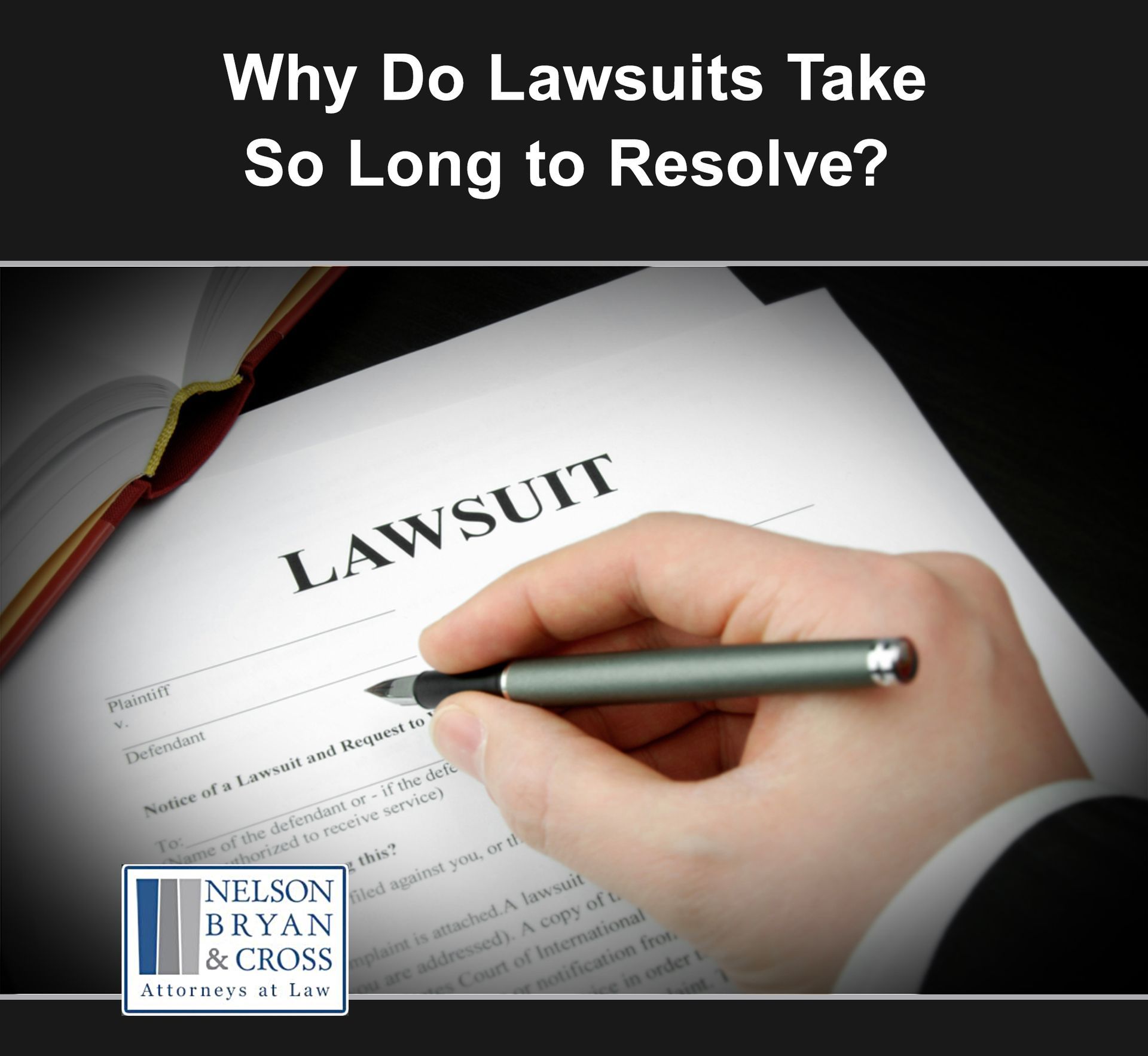
Every accident case is different. Some settle more quickly than others. However, it is not uncommon, for a personal injury case to take a year or more to resolve after the case has been filed in court. Evaluating the Injury Prior to filing a lawsuit, it takes time to determine the full extent of your injuries. Doctors are often unable to give an opinion about the seriousness of an injury until your condition has stabilized. In serious injury cases, it may even take a year after the accident before your doctor can say whether or not your injuries are permanent. It is extremely important to take the necessary time to fully evaluate your injuries. You have only one chance to prove the extent to which you have been harmed. Once you accept a settlement offer, that decision is final. You cannot go back and ask for more money if you later find out your injuries are more serious. An experienced personal injury attorney knows how to keep your case moving through the legal system. Your personal injury case may move through these stages: 1. Written Discovery The written discovery period can last over six months. You will be asked to answer written questions (interrogatories) under oath. You will also be asked to produce documents or authorize others to produce documents such as accident reports and medical records. 2. Depositions During a deposition, you will be asked questions under oath. A court reporter types a record of everything that is said. Not only will you be questioned about the accident and your injuries, you will be asked questions about what your health, education, and work were like before the accident. 3. Mediation and Settlement The Court almost always requires a settlement conference or mediation before personal injury cases can go to trial. At mediation, a neutral trained mediator goes over the issues and evidence with the parties to help guide them toward a settlement agreement. 4. Trial If your case does not settle and goes to trial, a jury decides what your injury is worth. It can take eighteen months or longer to get the trial scheduled. Once the trial is over, there may be further appeals and motions. It's possible for the parties to settle the case during trial or even after trial in order to end an appeal. Your best strategy is to contact an attorney with experience in handling personal injury cases. Your attorney can give you an estimate about the length of time it takes to resolve your type of case. Also, ask your attorney to give you frequent reports on the status of your case so you know that your case is making its way through the legal process. It's understandable that you may be frustrated at the speed your case seems to be moving. However, you should never rush to take the first settlement offer made by an insurance company. The first offer is rarely your best settlement offer. .

Distracted driving has been on the increase for the last several years and continues to be one of the leading causes of vehicle accidents throughout the United States. If you are texting and driving down the highway at 55 mph, that’s like traveling the length of a football field with your eyes closed. You can only drive safely when your full attention is on the road. Any activity that isn’t related to driving is a potential distraction and increases your risk of a collision. While most research points to a mobile phone as the number one culprit, it is far from the only activity potentially stealing a driver's attention. Eating or drinking, grooming, radios, other passengers - especially children, and even pets can also be significant factors. Distracted driving accidents are preventable 99% of the time. Driving can become mundane at times, but we all must remember when driving we have an obligation to the safety of not only ourselves but those who ride with us and other drivers we share the road with. Some studies show listening to podcasts or certain types of music can enhance our concentration. It’s important to practice safe habits behind the wheel. You want to make sure that your passengers know how serious you are about driving without distractions. One of the most effective ways to lead is through example. Be a good example for your friends and family by avoiding driving while you’re distracted.
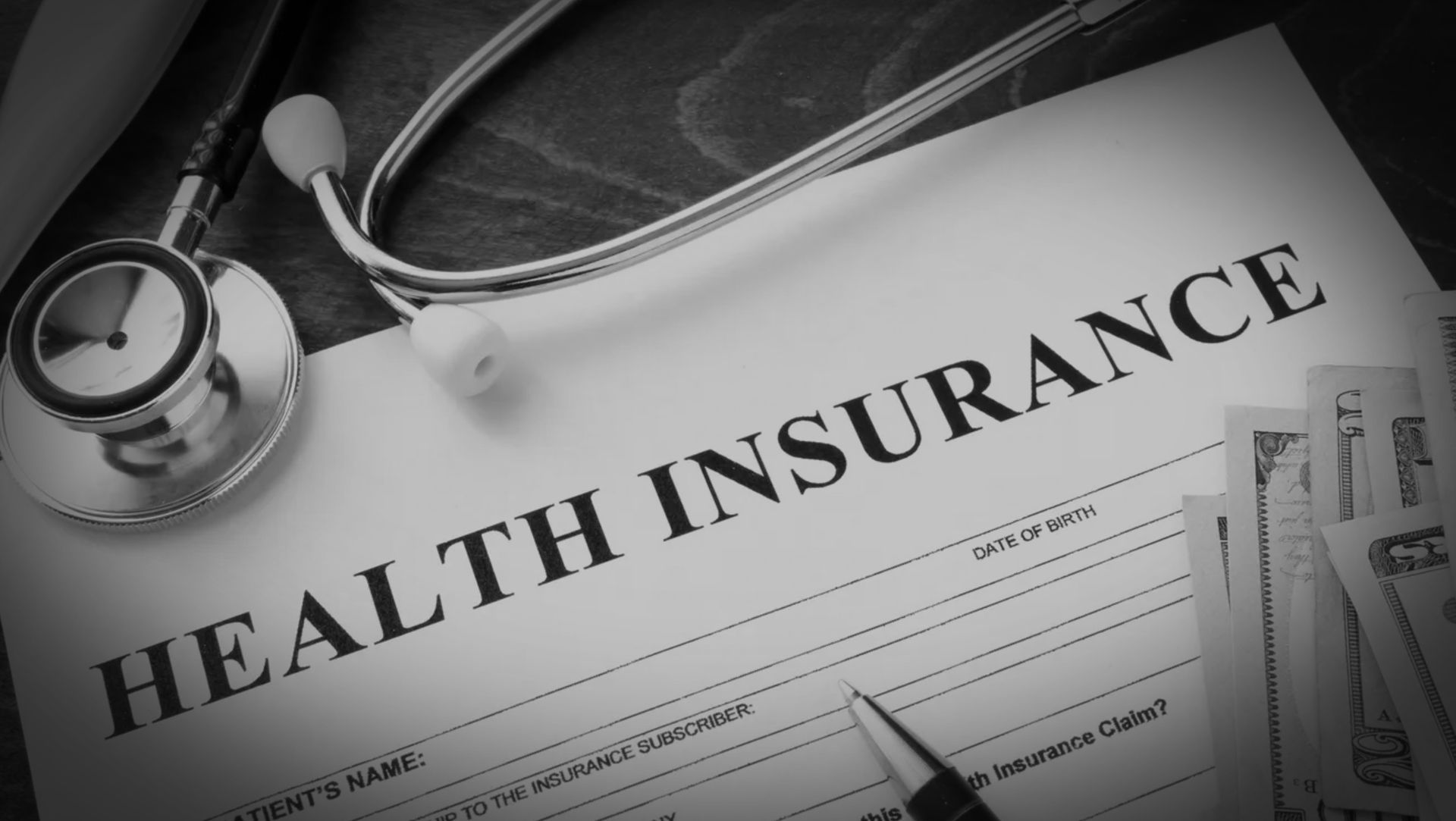
We see this question all the time. The injured party doesn’t want to use their own health insurance to pay for an injury. They believe it is the responsibility of the person at fault to pay for their medical bills. That may feel like the right position for an accident victim to take but the truth is, most of the time the injured party will end up with a larger settlement if they do, in fact, use their own medical benefits. Here's why; Health insurance companies have a negotiated price for medical services that is about 15 percent less than what people have to pay who don’t have health insurance. If your medical bills are $50,000.00 but Blue Cross Blue Shield pays $15,000.00 and the person who caused the wreck has $50,000.00 in liability coverage, that leaves $35,000.00 available for the injured party versus $0.00. Generally speaking, Blue Cross Blue Shield will reduce the $15,000.00 to $10,000.00 leaving $40,000.00 available. The point is that there’s more money available when you take advantage of your healthcare negotiated rates whether it’s United Health Care, Medicare, Medicaid, or Blue Cross Blue Shield. More money is better. Using your health insurance to pay your medical bills if you are injured, will almost always end up maximizing your settlement.

Once you reach the age of 65 you have many more options than before. As you know if you go on Medicare and you are under the age of 65 your options for health plans are limited. When you turn 65 you will have another open enrollment period to sign up for any plan you wish to get. In other words, just because you are already on Medicare does not prohibit you from having all the options a person not on Medicare and turning 65 would have.